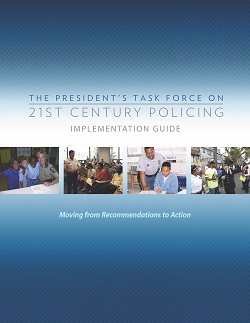DEPARTMENT OF JUSTICE
 The Department of Justice today released a new resource guide called “The President’s Task Force on 21st Century Policing Implementation Guidebook.”
The Department of Justice today released a new resource guide called “The President’s Task Force on 21st Century Policing Implementation Guidebook.”
It outlines strategies to help communities, law enforcement and local government implement recommendations in the President’s Task Force on 21st Century Policing Report.
President Obama announced the new guidebook today at the International Association of Chiefs of Police Convention in Chicago.
“The Department of Justice is dedicated to building trust between law enforcement officers and the communities they serve; enlisting the public’s assistance in reducing crime; and creating the stronger and safer communities that all Americans deserve,” said Attorney General Loretta E. Lynch. “This implementation guide offers a crucial blueprint for elected officials, law enforcement officers, and community leaders alike as they work to put important policies and reforms into practice across the country.”
Task Force’s Recommendations:
Communities
1. Engage with local law enforcement; participate in meetings, surveys, and other activities.
2. Participate in problem-solving efforts to reduce crime and improve quality of life.
3. Work with local law enforcement to ensure crime-reducing resources and tactics are being deployed that mitigate unintended consequences.
4. Call on state legislators to ensure that the legal framework does not impede accountability for law enforcement.
5. Review school policies and practices, and advocate for early intervention strategies that minimize involvement of youth in the criminal justice system.
Law enforcement
1. Review and update policies, training, and data collection on use of force, and engage community members and police labor unions in the process.
2. Increase transparency of data, policies, and procedures.
3. Call on the POST Commission to implement all levels of training.
4. Examine hiring practices and ways to involve the community in recruiting.
5. Ensure officers have access to the tools they need to keep them safe
Local government
1. Create listening opportunities with the community.
2. Allocate government resources to implementation.
3. Conduct community surveys on attitudes toward policing, and publish the results.
4. Define the terms of civilian oversight to meet the community’s needs.
5. Recognize and address holistically the root causes of crime.
To get a copy of the guidebook for yourself or to give to city officials click: DOJ Report

